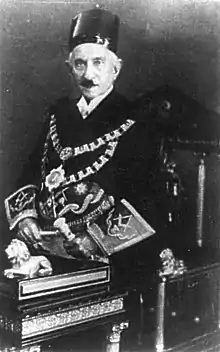Sir Temulji Bhicaji Nariman | |
|---|---|
 Nariman in his freemason's robes | |
| Born | 3 September 1848 |
| Died | 1 August 1940 (aged 91) |
| Nationality | Indian |
| Occupation(s) | Obstetrician and physician |
| Known for | Founding Bombay's Parsi Lying-in Hospital in 1887 |
| Medical career | |
| Awards | Kaisar-i-Hind Medal (1909) |
Sir Temulji Bhicaji Nariman RCSEd, also recorded as Tehmulji B. Nariman (3 September 1848 – 1 August 1940), was a obstetrician from Bombay (now Mumbai) who co-founded one of the city's first lying-in hospitals in 1887 and was knighted in 1914 for his work during the plague epidemic in India at the turn of the 19th century.
A graduate of Grant Medical College, he became its Dean and remained active in medical education. He headed the maternity hospital for twenty-one years, was awarded the Kaisar-i-Hind Medal in 1909 and became president of the College of Physicians and Surgeons of Bombay.
Early life and family
Temulji B. Nariman was born on 3 September 1848 to a poor family at Navsari.[1]
His marriage to Lady Nariman of Bombay of 82 years duration was officially noted as the longest marriage ever recorded.
Career


In 1872, Temulji passed his medical licentiate at Grant Medical College.[2] Subsequently, he became the first University of Bombay graduate to be elected its medical Dean.[2]
In 1887,[3] his interest in puerperal fever led him to co-found the Parsi Lying-in Hospital,[2] one of Bombay's first maternity hospitals,[4] which was completed in 1895.[3] It was later popularly known as Temulji's Lying-in Hospital[5][6] and he came to be symbolic of "Parsi motherhood".[7] Nariman headed the maternity hospital for twenty one years and joined the Governor's council in 1910.[7]
In 1902, he prepared an essay describing his time at Grant Medical College (1867 to 1902). Among the descriptions of the training and examination arrangements there he noted that the college physicians were often in competition with local "quacks" and unqualified medical practitioners known as vaids and hakims who offered traditional remedies and sometimes were able to claim a success when a patient who was already close to recovery was transferred to their care.[2]
For his diverse activities, Nariman was awarded the gold Kaisar-i-Hind Medal in 1909.[8][9]
In 1913, Nariman was elected vice president of the newly formed College of Physicians and Surgeons of Bombay and later became its president.[10][11]
He was knighted in 1914 for his work during the plague epidemic in India at the turn of the 19th century.[12][2] He later became a Fellow of Royal College of Surgeons of Edinburgh in 1922,[13] by which time he claimed to have attended more than 25,000 maternity cases.[14] He was selected as Sheriff of Bombay for 1922–23.[15]
From 1932 to 1938, he was grandmaster of the District Grand Lodge of India,[16] the first grandmaster of All Scottish Freemasonry in India.[17]
Death and legacy
Nariman died on 1 August 1940 at almost 92.[18] A painting of him was unveiled at Grant Medical College in 1925.[19] In 2014, plans were confirmed to rebuild Temulji's Lying-in hospital into an orthopaedic hospital.[20]
References
- ↑ Nariman, Sam D. (1941). Dr. Sir Temulji Bhicaji Nariman Kt: A Short Sketch of His Life. Mody's Diamond Print. Works. p. 1.
- 1 2 3 4 5 Pandya, Sunil (2018). Medical Education in Western India: Grant Medical College and Sir Jamsetjee Jejeebhoy's Hospital. Cambridge Scholars Publishing. p. 258. ISBN 978-1-5275-1805-6.
- 1 2 Dwivedi, Sharada; Mehrotra, Rahul (1999). Fort walks: around Bombay's Fort area. Eminence Designs. p. 132. ISBN 9788190060233.
- ↑ "The history behind the Parsi Lying-In Hospital". Zoroastrians.net. 18 October 2014. Retrieved 31 October 2018.
- ↑ "Parsi maternity home on the block". The Times of India. Retrieved 3 November 2018.
- ↑ "Tehmulji Parsi Lying In Hospital case thrown out as 'infructuous' by Supreme Court". Parsi Khabar. 27 March 2017. Retrieved 3 November 2018.
- 1 2 Ramanna, Mridula (2012). Health Care in Bombay Presidency, 1896–1930. Primus Books. p. 93. ISBN 978-93-80607-24-5.
- ↑ "Meetings of Branches and Divisions; Bombay Branch". British Medical Journal. 2 (2544): S245–S252. 2 October 1909. doi:10.1136/bmj.2.2544.s245. ISSN 0007-1447. PMC 2320955.
- ↑ Nariman, Sam D. (1941), p.50
- ↑ Nariman, Sam D. (1941), p.37
- ↑ "Convocation Address at The College of Physicians and Surgeons of Bombay". The Indian Medical Gazette: 308. May 1954.
- ↑ "Page 270 | Issue 12647, 27 February 1914 | Edinburgh Gazette | The Gazette". www.thegazette.co.uk.
- ↑ "RCS (Edinburgh) fellowship" (PDF). British Medical Journal. 2 (3229): 1002. 18 November 1922. doi:10.1136/bmj.2.3229.1002-a. S2CID 220197757.
- ↑ "India". British Medical Journal. 1 (3203): 816–817. 20 May 1922. doi:10.1136/bmj.1.3203.816-a. ISSN 0007-1447. PMC 2416146.
- ↑ Directory Of Bombay City Province 1939. 1939. p. 86.
- ↑ "Lodge Sir Tehmulji Nariman". www.dgli-sc.com. 1909. Retrieved 3 November 2018.
- ↑ Luhrmann, Taya M. (1996). The Good Parsi: The Fate of a Colonial Elite in a Postcolonial Society. Harvard University Press. pp. 94–95. ISBN 978-0-674-35675-7.
- ↑ "People: Marriage that has lasted for 75 years". The Independent. Archived from the original on 26 May 2022. Retrieved 29 October 2018.
- ↑ "Service Notes". The Indian Medical Gazette. 60 (11): 555–557. November 1925. ISSN 0019-5863. PMC 5188887. PMID 29010320.
- ↑ "Vacant for 25 years, Parsi Lying-In hospital to become Rs 100 crore ortho facility". Mumbai Mirror. Retrieved 3 November 2018.
Further reading
- Dr. Sir Temulji Bhicaji Nariman Kt. : a short sketch of his life, S. D. Nariman (1941), OCLC 12719384.
- History of Lodge Rising Star of Western India, by D. F. Wadia, Bombay, British India Press (1912).